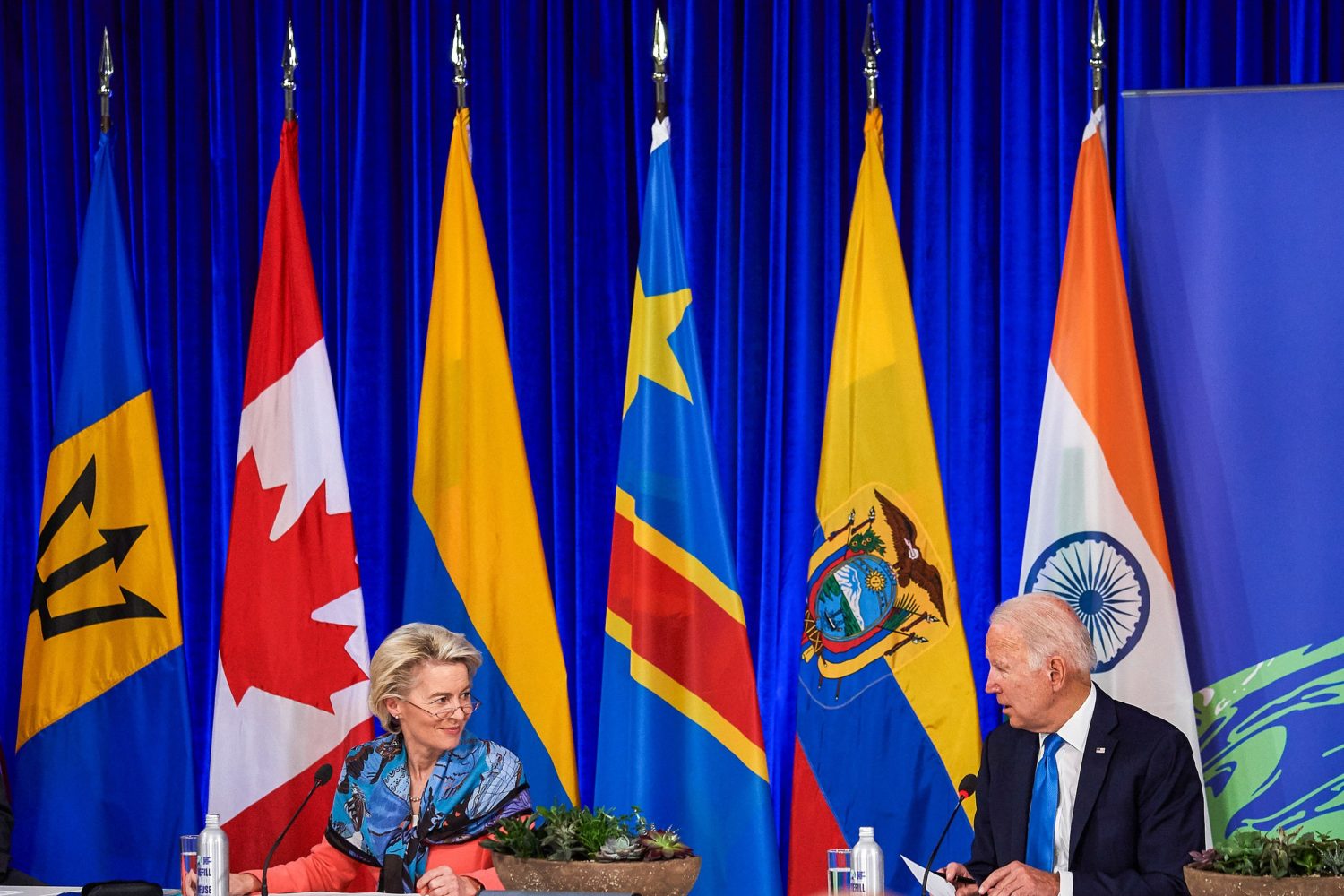Caught in the crossfire
A green trade war is brewing between the EU and the US, with urgent lessons if Keir Starmer wants the UK to be a “green growth superpower”, writes Will Aitchison
At the Confederation of British Industry’s November conference, Keir Starmer reiterated his ambition for the UK to become a “green growth superpower”. Superpower status requires competitive industries able to export goods and services abroad. By the time he wins power, however, that may be more difficult: a transatlantic green trade war is brewing, and the UK must move fast, or key green growth opportunities could be wiped out by protectionist policies from larger powers.
Much of the tension between the US and the EU has flown under the radar in the UK. It all started with the policy approach taken in August’s $369bn US Inflation Reduction Act: after months of negotiations, the final policy is a subsidy sugar rush, and a slap in the face for EU countries with more economically orthodox climate policies. The US package focuses primarily on providing huge decarbonization incentives: for example, it offers companies the opportunity to earn $85 per tonne of carbon they capture, in contrast to the EU carbon price system which imposed a cost on companies of around €70 per tonne of carbon emitted this year. The act also directly favours US companies, with ‘Buy American’ requirements for electric vehicle subsidies, in contrast to the EU’s origin-agnostic subsidies.
Last month, EU leaders raised the alarm on nine of the US provisions to the WTO. President Macron has proposed a ‘Buy European Act’, now supported by Germany, to protect EU car makers, citing US and Chinese protectionism. Last week, the EU Commission indicated it will adapt strict state aid laws which would enable EU countries to unleash bigger subsidies.
In the context of this global green arms race, the three climate action areas identified by Labour’s green jobs National Policy Forum consultation – energy efficiency, electric vehicles (EVs) and renewable energy generation – represent very different prospects in terms of achieving ‘green superpower’ status. Using UK government-commissioned economic analysis to assess relative domestic and export opportunities in these areas, this article considers Labour’s plans in the context of new international climate policy dynamics.
Labour’s £60bn proposal to insulate 19m homes is guaranteed to create a lot of green jobs, and is one of the most pressing delivery priorities for achieving net zero, but will not boost the UK on the world stage. The sector offers only moderate export opportunities, estimated at £720m a year by 2030, while domestic retrofit could generate a very significant £6bn a year. And despite not being caught in green trade tensions, retrofit has suffered a decade of policy false starts under the Tories. In this area, Labour should focus on the domestic delivery effort rather than embarking on a game of competitiveness catch up with European rivals.
Road transport, primarily electric vehicles, is identified in the analysis as a strong export opportunity for the UK potentially worth £2.5bn a year by 2030, and a modest domestic opportunity estimated at £390m. However, the Inflation Reduction Act is already drawing investment from the UK, and if EU-US trade conflict results in protectionist EU policies, the business case for manufacturing in the UK to sell to the EU – destination for over 50 per cent of UK exports – will weaken.
Labour aims to part-finance three battery manufacturing gigafactories to supply local EV production. Strong government backing for missing elements of a UK-based EV manufacturing supply chain is the right move, but Labour will also need to establish a rapid retraining scheme to enable workers to step up to the opportunity. Even then, the sector faces considerable headwinds: Starmer’s team will inherit an automotive industry which has halved its output since 2016, with an EV future now critically vulnerable to trade tensions.
Labour must tackle the diplomatic challenge head-on while bolstering its own incentives, making the case to the EU that strong UK manufacturing can help to challenge Chinese EV domination. This argument, if accompanied by improved EU relations, could open opportunities to shield British manufacturing from protectionist barriers. In parallel, Starmer should urgently explore how post-Brexit state aid can replicate the success of persuading companies like Stellantis to convert plants to electric models rather than move abroad, as BMW has announced it will with the MINI brand.
Offshore wind has good export potential, worth £1.4bn a year by 2030, and a similar domestic opportunity of £1bn per year. Compared to EVs, there is a clearer pathway to success thanks to a decent policy start, some existing supply chain strength, and a lot of windy coastline. UK efforts to increase domestic content in offshore wind construction were progressed via the 2019 Offshore Wind Sector Deal, and the UK has one of the largest installed offshore wind capacities in the world. However, further efforts to increase local content via its contracts for difference (CfD) subsidy scheme were challenged by the EU this year as in breach of WTO rules. The government backed down, suggesting the UK needs to develop a punchier approach to building local supply chains.
Labour plans to found a publicly-owned energy generation company – GB Energy – so that the UK can increase and own its renewable energy capacity rather than gifting the opportunity to foreign companies. While details are scarce, the plan is a significant step forward from existing Tory efforts, and is supported by 72 per cent of 2019 Tory voters. Labour should pursue a maximalist approach with a focus on developing areas of high export opportunity like turbine manufacture and floating platforms for deep water installations. Negotiations should be initiated now with the Crown Estate to agree preferential access to portions of the UK seabed.
Labour can and should go big on climate action, but it must recognise the divergent prospects of key action areas. Offshore wind shows how domestic decarbonization efforts and a punchy government-led initiative could pave the way to superpower status in specific, high-value components and services, but this will not be the case in all sectors.
In its approach, Labour must learn from the EU’s hard lesson this year. Textbook climate policy will not win the green growth race.
Image credit: Dati Bendo via Wikimedia Commons
Image credit: Ross, CC BY-SA 2.0 via Wikimedia Commons

